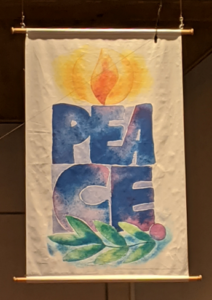 When we were children, my siblings and I used to enjoy walking along the top edge of logs in the forests and parks we visited. Some logs were small and near the ground. Others were very thick and we might find our heads were as high as our parents’ heads as we walked along, holding tightly to their hands. There was always the very real fact that we might at any moment miss a step and fall off the log. Mom or Dad would help us when we tottered and nearly fell.
When we were children, my siblings and I used to enjoy walking along the top edge of logs in the forests and parks we visited. Some logs were small and near the ground. Others were very thick and we might find our heads were as high as our parents’ heads as we walked along, holding tightly to their hands. There was always the very real fact that we might at any moment miss a step and fall off the log. Mom or Dad would help us when we tottered and nearly fell.
As we got older, we got more certain of our footing and walked by ourselves across the logs, arms outstretched to maintain balance. Sometimes we made it across safely. Other times we found ourselves jumping as we fell off. Once in a while, an ankle got twisted or we landed ungracefully on the ground. Most of the time, we simply got up and tried it again.
Even as an adult, it’s fun to walk on a log sometimes. I’ve now been in the position of holding the hands of younger siblings, cousins, my own children, and even my grandchildren as they learned to walk on a log. There’s always the unspoken question, can you do it? Can I still do it? Will we fall off this time?
Falling off the log is much easier than balancing and walking along the top of the log. If the log is a bridge across running water or across a ravine, the stakes are even higher. Falling off can still be easier than getting across.
When the Lord asked Solomon what gift he would like as he began his reign as King of Israel, Solomon asked for the gift of wisdom. He explained, “Who can know God’s counsel, or who can conceive what the Lord intends?” (Wis 9:13-18b) It’s hard enough for humans to figure out their own plans. What to do when troubles come? What career to pursue? Where to find food and shelter? Whose respect is worth courting? Solomon rightly notes that the things of heaven are even more important than the concerns of daily life, but they can be even harder to figure out. What is it that God would want us to do in this particular situation? Is it always the same? What might be different this time around?
Yet Solomon trusts that the Lord will send his ”holy spirit from on high” to help those who ask for help in finding the straight path through life. With the help of the spirit of the Holy One, humans can walk across the log of life securely. Finding the ways of heaven is not as easy as falling off a log. But the spirit’s gift of wisdom helps us walk securely across the top of the log – finding the ways of heaven in our lives each day.
Even before Solomon became king, the Hebrew people recognized the hand of the Lord in their daily lives. The psalmist notes, “In every age, O Lord, you have been our refuge.” (Ps 90) Our lives are short, yet through them we grow in wisdom of heart. We wish for the kindness of the Lord and receive it, as the work of our hands is aided by the Lord. That steadying hand of the Lord helps keep us balanced atop the log we walk!
As Jesus walked along on his way to Jerusalem, great crowds followed him. He was a celebrity and folks wanted to be associated with him. Would there be a miracle worked? Would he notice me and perhaps praise me? Isn’t this exciting?
St. Luke tells us that Jesus wanted folks to understand clearly that simply walking along with him in the midst of a great crowd of excited people was not what it meant to be one of his followers. (Lk 14:25-33) So Jesus turned to the crowd and spoke to them. The words he used sound quite harsh to us today. “If anyone comes to me without hating his father and mother, wife and children, brothers and sisters, and even his own life, he cannot be my disciple.”
Hating? Just a minute now, you say. Isn’t this supposed to be about loving each other?
When we today speak of hating someone or something, it’s a very negative notion of extreme revulsion, distaste, antipathy, or hostility that may stem from anger or fear, or a sense of having been injured by another person. But in the context of Jesus’ time, it meant something different. Hate is part of a pair of words that describes behavior. It is the opposite of love, which also refers to a specific type of behavior. It’s not a question of emotions. To “hate” a ruler, for example, means to rebel against that ruler. To “love” the ruler means to obey that person. Jesus wanted those following him to know that there would be times in their lives as his disciples in which the choices they would be called to make, the actions they would need to take, would be contrary to those expected of them by their families and friends.
In Jesus’ culture and time, one’s only security came from being part of a large extended family. No one could get along without the support and help of the family. Yet the call to follow as a disciple of Jesus was and is something that is individual. Typically, families did not all pack up everything and follow him. Families were not the individual, nuclear family of a married couple and their children that we experience in the Western world. Families included parents, grandparents, aunts, uncles, cousins, siblings, in-laws, nieces and nephews, and the servants of the family. The preferences of the individual did not matter. The well-being of the family was what mattered. If one person wished to follow Jesus, there could be no certainty that all in the family would do so. Much more commonly, those who followed Jesus’ teaching would be acting on their own, against the wishes of the family. In doing this, they would be perceived as “hating” the family members who did not agree with their decision to live differently. They would be rebelling.
Jesus described the reality of social isolation from the family as carrying one’s own cross. It is very difficult to go against one’s family, friends, and community. It is painful to follow a different path and to experience the hard words and rejection that can entail.
He warned those who were traveling with him in the crowd to weigh carefully what they were doing, just as a builder of a tower or a king going out against an enemy with superior forces must do. Everything is on the line. Can you leave behind the security of family, friends, and property to follow? That’s what is demanded of Jesus’ disciple.
Not at all as easy as falling off a log. It’s much harder to stay on the log …
St. Paul gives us an excellent example of the kind of situation a follower of Jesus might encounter that would be totally contrary to normal social expectations. (Phil 9-10, 12-17) An escaped slave named Onesimus has become a friend and convert to Christianity in Rome when Paul is imprisoned there, awaiting trial before Caesar. Slavery is an accepted reality in society at the time. Complicating matters, Onesimus stole from his former master, so not only is he guilty of running away, he’s also guilty of theft. Both carry heavy penalties.
As if that were not enough, the man from whose household Onesimus has escaped is a friend of Paul who lives in Colossae and is one of the leaders of the Christian community there. Philemon is one of Paul’s converts too.
In a very short private letter to Philemon, Paul asks him as a friend to accept Onesimus as a returning brother in Christ, welcoming and treating him as if he were Paul himself coming to visit. Paul notes that he would like to have Onesimus remain with him, but that would not be right, since legally he belongs to Philemon and the latter has not given permission to his slave to serve Paul instead. Paul suggests that perhaps the underlying reason for Onesimus’ having escaped from slavery to Philemon was so that he could learn of the Lord and become a follower and partner in spreading the Good News. He asks Philemon to welcome his slave as a man who is a brother in the Lord.
In our time, with our understanding of the evils of slavery, it’s easy to say that of course, Philemon should receive Onesimus and give him freedom. In fact, we’d say all the slaves should be freed. But that wasn’t the way things were at the time. Paul’s letter is suggesting a very new approach to human relations, in a specific and very limited situation. The community had not yet realized that Jesus’ second coming would not be in their lifetimes. And there weren’t enough of them to have any significant influence on the laws of the Roman Empire! But they could decide to go against the prevailing custom and forgive a thief and runaway slave.
For Philemon, accepting Onesimus would not have been as easy as falling off a log. It would have taken a major decision to grant the request of his friend and mentor, Paul. The fact that this short letter, of only 25 verses, has come down to us today indicates that it was a beginning of something remarkable within the Christian movement. Slaves could be equals of their masters when they were part of this new family, the Body of Christ, the Church.
Two thousand years later, we too sometimes find ourselves having to make tough decisions. We are still called as individuals to make life-changing choices. The people we serve, the occupations we enter, the friends with whom we interact, the communities with whom we pray – all reflect the relationship we have with our Lord. When our beliefs and experiences differ from those of our family and friends, it can be hard to remain on good terms with them. Families can be split apart so easily. It takes a conscious decision and lots of patience to get past differences of opinion and keep the love alive.
We each have our own calling and our own part in the Lord’s mission here on earth. How can we help each other to stay up on the log? It’s so easy to fall off.
Jesus knows that it’s much easier to fall off the log than to follow him. That’s why we have each other as a family larger than our own biological family and even our own community. He has given us himself and all the members of his family of followers. We help each other along the way.
So then, here we go. Off to the park. Who’ll get across the log this time without falling off? I’ll help you and I hope you’ll help me too.
Readings for the Twenty-third Sunday in Ordinary Time, Cycle C
Read More
 It was an afternoon class, after a long day at school for all of the children. They had come together from several schools for religious education class that afternoon. They were members of the same parish, so they knew each other, had been in classes together since kindergarten. They were friends. They happily visited with each other until their teacher called them together to begin the day’s lesson.
It was an afternoon class, after a long day at school for all of the children. They had come together from several schools for religious education class that afternoon. They were members of the same parish, so they knew each other, had been in classes together since kindergarten. They were friends. They happily visited with each other until their teacher called them together to begin the day’s lesson.

































